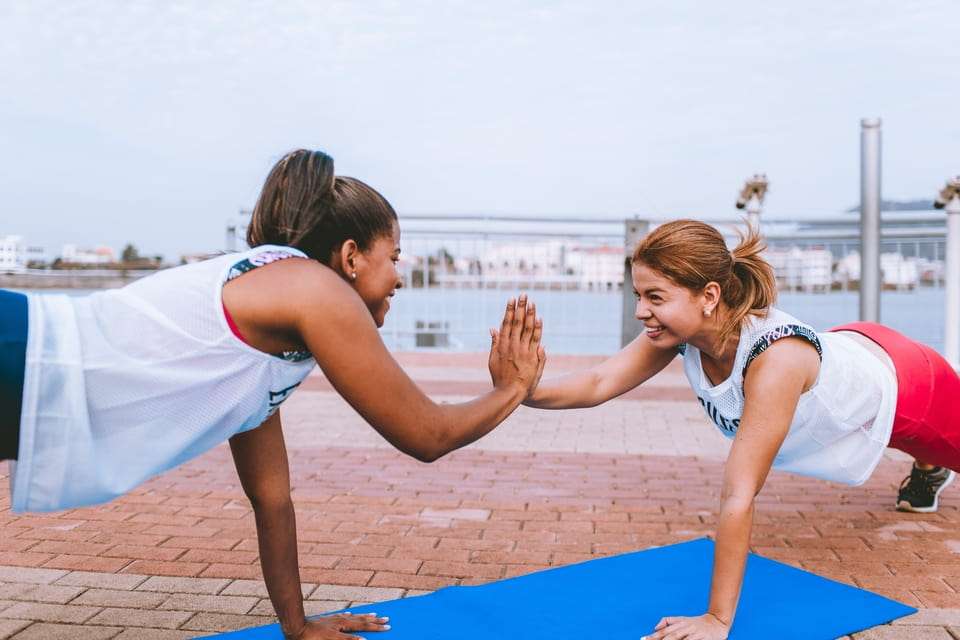Exercise is a key aspect of maintaining one’s health. It has been proven to offer many benefits for both physical and mental well-being. When it comes to addiction and recovery, exercise and physical activity can provide even more advantages which make the journey to sobriety easier. In addition to the positive feelings exercise gives everybody, for those in addiction recovery, exercise has been proven to have a host of other benefits as well. This includes increasing the rate of abstinence, easing withdrawal symptoms, as a distraction from cravings, and relieving anxiety and depression that can arise during recovery.
Rehab Costs & Options for Alcohol | Drugs | Other addictions
Most good rehabs now have a gym or pool and many addiction centres encourage exercise as part of treatment. Because exercise reduces the chances of relapse, it is now even being explored as potential treatment for substance misuse on its own.
Benefits of Exercise in Addiction Recovery
Exercise offers various benefits, whether you’re in recovery or not. However, there are several reasons why it is even more important for those in addiction treatment to take it up.
-
Elevated Mood
A lot of people say that exercise makes them happy. There’s a good reason for it. Any form of physical activity releases feel-good hormones such as endorphins. Exercise is a common go-to for anyone as a treatment for depression and stress.
Exercise also allows you to take out the energy you’d normally waste on stress and channel it into something more beneficial. Especially in the early months of addiction recovery, this positive effect of exercise can be a great benefit.
-
A Good-Night’s Sleep
Exercise is known to improve the quality of sleep. With regular exercise, you will find that you sleep longer and better. It is well-known that sleep is essential for your body and brain to rest and recover.
A good-night’s sleep can also improve overall mood and reduce stress. Think about the many times you’ve been cranky after a night of insomnia.
-
Increased Energy
Although it may seem contradictory, exercise can actually boost your energy levels. Even if you feel worn down after a good work-out, you will find that you also feel refreshed. For example, if you are falling asleep at work, a brisk walk can help wake you up as much as a coffee.
-
Distraction
Finding a distracting activity during recovery is important, especially if you’re dealing with cravings. Now that you’re sober, you will have more time to focus on other things instead of your substance. If this territory is unfamiliar to you, you might feel bored. Addiction recovery can be hard, and exercise can be a healthy way to fill your time and take your mind off stressful thoughts.
A regular exercise routine also adds structure to your life. Having some sort of routine is very important when you’re trying to get back on your feet in recovery.
-
Less Stress
Stress is common in recovery, and can contribute to relapse if not addressed. Perhaps you are anxious that you will not be able to stay sober. Or maybe you are uncertain about doing things in a new way. Such stresses are common. But by doing simple and regular exercise in addiction recovery, you can gain a sense of purpose and competence that help to counter such feelings.
-
Overall Well-Being
Many people in active addiction fail to take good care of themselves. Many also lose some physical strength. Regular exercise and a good diet can help your body and mind recover, and thus contribute to your sense of wellbeing.
Exercise can also improve your immune system, endurance, skin and muscle tone, and boost your self-confidence. The harder you work on improving yourself, the more results you will see. In turn, witnessing those results will also motivate you to keep going.
How to Stay Active: The 7 Best Exercises for Addiction Recovery
If you’re not participating in physical activities already, you should add some exercise to your recovery plan whatever your age and state of health. There are many ways you can stay active – exercise doesn’t have to be strenuous.
Both strenuous/aerobic and mind/body exercises have proven to be effective in recovery. However, where harder drugs have been abused, more intense exercise appears to offer more benefit. Regardless, you can always start somewhere. Once you find an activity that you enjoy, it will not take long to feel the benefits.
If you’re seeking suggestions on where to start, here are some ideas:
A Simple Stroll
If you’ve had to deal with a long-time addiction, you may feel worn down, especially after detox. This may make it hard to engage in any kind of sport in the beginning, so start small. Even a 30-minute stroll in the park can be beneficial. You might find the walk to be so relaxing that you’ll keep going further.
Hiking
Being outside and among nature can boost your mood alone. Not to mention, being in the sun allows you to get some vitamin D.
Hiking doesn’t need to be serious and doesn’t need any special gear apart from some suitable shoes. There are many easy trails you can start with. When you’re tired, you can always take a break and enjoy the scenery. Hiking with a purpose can help motivate you too. Pick a trail that has a view to look forward to at the end.
Yoga
As a less-strenuous alternative, yoga and similar mind-body exercises can benefit you as well. They also double as meditation. There are many types of yoga, and you can always choose a more relaxing practice. Because of the growing popularity, classes can be found in most gyms and community centres.
Swimming
Swimming is a great option for a workout that is significantly easier on the body. If you’re older, you are likely to be looking for exercises that do not impact your joints or muscles too much.
Simply being in water can be very soothing, and swimming doesn’t have to mean doing laps. You can also opt for an hour of freestyle swimming in the pool. Or participate in an aqua-aerobic exercise for some fun!
Dancing
If you’re looking for a form of exercise that doesn’t feel like exercise, dancing is a no-brainer. It is also a social activity that your friends will be likely to join in on. Dancing comes in many forms, and classes for all types, from ballet to ballroom to latin, are becoming increasingly popular.
Most studios allow you to sample the first class for free, so you can try a few to find one that’s perfect for you.
Team Sports
Many people find exercising alone to be boring, which is why joining a team sport can be motivating. Like dancing, it is a good way to bond with people and learn to form relationships. Try out football, basketball, rugby or cricket. Or you could go for a less popular team sport, like shinty or frisbee, to find the best fit.
Weight Lifting
Weight lifting can be very beneficial, and fun. However, it should never be undertaken without advice and supervision as it has the potential to harm your tissues.
You don’t have to be a bodybuilder, or an aspiring one, to practice simple light weight-lifting. And you don’t have to lift large weights to get the benefits. If you’re just starting out, doing a few routines with light weights can be sufficient. In no time, you will see progress. Not only is weight-lifting good for the bones, joints, and muscles, but it also reduces depressive symptoms.
If you’re older, some light weight-lifting is highly recommended. It can prevent tissue and bone-mass loss due to ageing, and maintain your physical strength.
Exercise is Not Enough in Addiction Recovery
No matter what type of exercise you choose to engage in, you will find that it will greatly aid in your recovery from addiction. Although it is highly important in aftercare, exercise should also be part of your initial treatment if possible.
In addition to exercise in addiction recovery, you should also focus on nutrition. A healthy diet serves as a complement to exercise, and will greatly improve your well-being if combined.
But remember that exercise is not a replacement for a proper addiction treatment programme. While exercise and physical activity can greatly help with recovery, other aspects of treatment, including therapy, should not be neglected.



